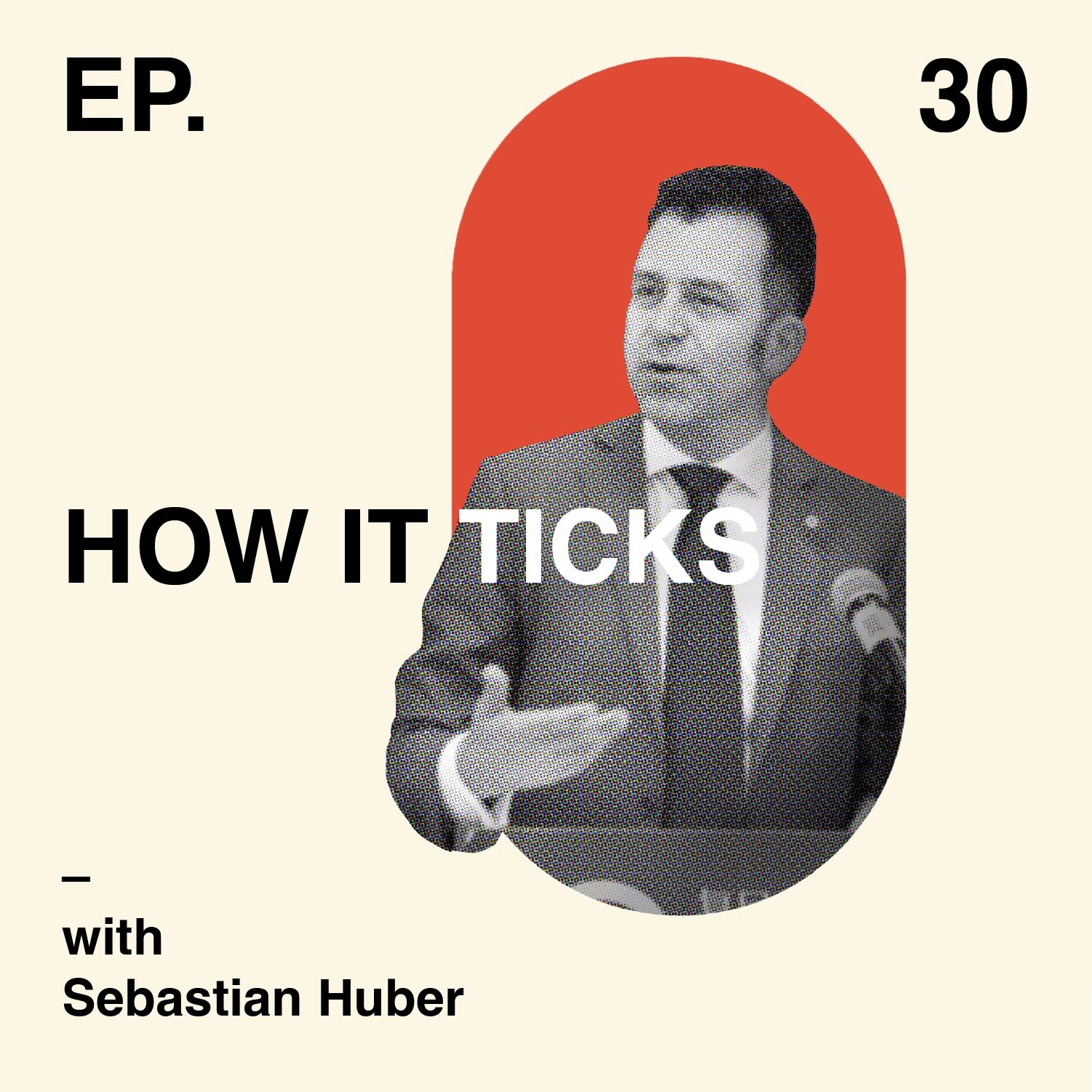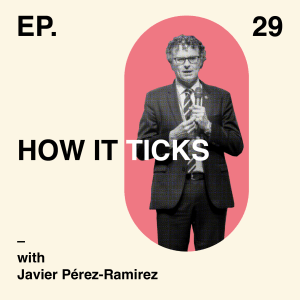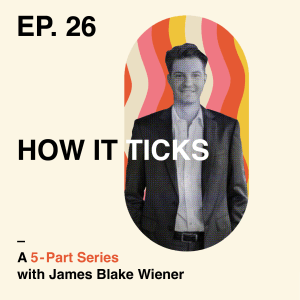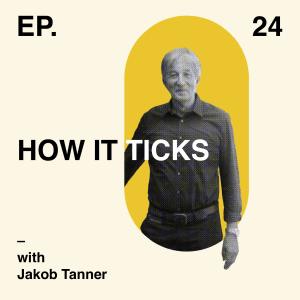
How the Swiss trade with China: The Secret to Their Success (#30)
Episode Summary
In this episode, I sit down with Sebastian Huber, an expert in global trade and luxury goods with a deep focus on the business dynamics of Asia, particularly China. As a lecturer and researcher at the Lucerne University of Applied Sciences and Arts and with a background that includes global roles at luxury brands like Montblanc, he brings a unique perspective on Switzerland’s place in the global market.
Expect to learn about the Swiss luxury industry, why Switzerland became a global hub for luxury brands, and how this craftsmanship is maintained. We dive into the unique Switzerland-China free trade agreement, what it’s like to trade with China compared to other countries, and the challenges of competing Chinese brands. The conversation also explores how global political factors impact Switzerland and the future of luxury consumption in Asia.
Meet Sebastian Huber
Sebastian Huber is an expert in global trade and luxury goods. He has his own consulting practice, Sebastian Huber Consulting, and lectures and researches at the Lucerne University of Applied Sciences and Arts. With an impressive career that includes global roles at luxury brands like Montblanc and a dual MBA/Master’s degree from Fudan University in Shanghai, he brings a unique perspective on Switzerland’s place in the global market.
Full Transcript
Mike: [00:00:00] Sebastian, looking at things through the lens of global trade and economics, what is it that you think the West misunderstands about China and the way China do business?
Sebastian: What, China has as a characteristic is this different understanding of time and, and longevity in the sense of, it, you know, looking at a period like we are in right now post COVID and a few years, that period for China is put in context of a 4,000 years history as an empire.
An understanding of being the center of the world in terms of innovating paper to, you know, so many, incredible merits the country has. You know, the Great Wall of China is something absolutely mind blowing. Whenever, you have the chance to go and see it, you should actually go there because it’s, it’s really something out of this world. And in that understanding, this current [00:01:00] period of difficulty transition, economic challenges, it is a very short timeframe. And it, and it’s only a transition towards regaining, for formal glory and, and basically repositioning itself on the world stage. And in that sense, China’s very strategic, looking at what’s happening in other parts of the world.
They, they’re certainly putting their, let’s say. Chess, figures in position that when the time arises be it in global bodies, in international organizations, even in geopolitics, they’ll certainly seize the opportunity. And we don’t have, we, we shouldn’t forget about that.
It’s, it’s just because all the noise at the moment is coming from Washington, doesn’t mean China is not active. They’re pursuing their plans in the bigger grand scheme of things, and they’re very open about it. Even they have a five-year plan. And if they say in the five-year plan, we are gonna [00:02:00] build a railroad from Shanghai to Istanbul, they’re building that railroad. And with very little notice, the first train ran from Shanghai, to Tehran just a few weeks ago. It was a, a side note in some of the media around the world. To, to those I would say who understand how China works. It’s not a surprise that it happened and that it happened in the period that they announced it would happen. But we seem to forget how persistent China is pursuing those targets.
China has lived through enormous transformation, in most of the 20th century especially, and I think the y the West yet has to come to Crip in what that really meets and it hasn’t ended. One, one point in time people might have thought, well, you know, China now opened up and it’s, it’s dealing with all these manufacturing processes and taking care of so many things, but China has been moving on, from there to its own ecosystem.
And [00:03:00] when I visited, post COVID, especially last year and this year, I realized it, it decoupled itself from. The Western systems in many ways. One could say that from the opening up in the late seventies, early eighties, until the pre COVID years, China always looked at, adhering to Western processes, western systems, trying to interact with them, keeping its own specifics, but then trying to connect and post COVID one would say, or I, I would observe elements of this really disconnecting, saying, we need, this needs to work for us in China and we take from whatever we can in the global trade to our best benefit, but it’s no longer in our interest to really adhere to a global trading system. And that changes probably more than most people, in other parts of the world have yet realized.
Mike: How capitalist is China. When I think about it, you have this very strict, overarching government, which seems to have the final say. [00:04:00] And there are things which it seems you cannot say or do in China, respect to your government. But if you look at the economic growth in the last few years, it seems like a very capitalist free market country.
How would you define its economy like that?
Sebastian: Not sure you can really define it, but I’ve always lived in China, is is an overlap of different Chinas, so you have this ancient, you know, centralist,
Kingdom understanding of China with all the traditional rules and, and, and the, the confucianist, beliefs, et cetera. And that’s one reality and that has a certain impact on the economy, on some very practical things, on how dates are set or how you name a brand or you know, all these things, which might be very un capitalistic.
It might sacrifice a good share of your market if, if your brand has the wrong name or you launch it on the wrong date or things like that. But then you have this communist China that still persists, today, where from the planned economy times, [00:05:00] companies are forced to keep a certain amount of labor employed, of even unskilled labor to make sure there’s no unemployment in the market and things like that. Not capitalist at all, might actually not do good on your balance sheet or, or profit and loss statement at all, but still there and imposed by the central government as you say. And then there is indeed the capitalist time, from basically the opening up, where lots of very free market approaches were introduced to China.
And they also are present today the free trade zones, for example, the pong area in Shanghai, which developed enormously, in very short period of time with, with growth, which was phenomenal and very capitalist behavior also of different parts of the economy, like the labor market, you know, on people changing jobs for very little more money somewhere else.
And, you know, these types of things which we would see. In other very competitive markets. Other example is the, the launch of sharing bike apps and, and services, which overflew the market with bicycles [00:06:00] all across the cities, which nobody used just for competing for more market shares that all tried to get as many bikes out there as possible, which ended up in a, in a pretty chaotic situation.
So, you, you always see these elements present and they’re overlapping. So I’ve experienced that in one sentence. You would get a reference back to a Confucianist principle, and in the next part of the sentence people would argue that that’s why they raise their prices
or things like that. So, so these are really present at the same time.
And, and therefore it’s difficult to say this is the type of the economy that we see. What we do see, and again, especially, post COVID is that, the government has a strong grip on the economy, again, more than let’s say before. For various reasons. And, and that has led to a number of legislations, a number of policies, that makes doing business in China more complicated because you need to understand that additional legal framework you might [00:07:00] be observing as if you were competing in a free market with your Chinese competitors or, with choosing between two Chinese suppliers. But then there is behind a, a hidden political agenda on certain principles that makes some of the trade and some of the business transaction, still a lot more, more complicated than in a more free economy as such.
Mike: I’ve certainly noticed too that, I mean, historically, China, Chinese goods are low quality, cheap stuff, and, and I, and I, I always think of Chinese cars as an example. I remember Great Wall was the name of the car brand that I can remember that I first start seeing on Australian roads. And it was just a hel it had a safety rating of 0.5 stars and, and now you actually have nice electric Chinese cars, which are in competition with Tesla.
So it also seems like the quality of their product is also increasing.
Sebastian: Absolutely. And [00:08:00] so somehow the rest of the world is also responsible for that. In the first phase of opening up, China needed to catch up with global manufacturing standards on product quality, service quality, all sorts of levels, right? And, and they were very quick in doing that. But then many brands, many companies, transferred so much of their manufacturing to China that actually the supply chains, the labor skills, even some of the infrastructure is really only available these days in China. So when you, the recent discussion about, bringing back production, let’s say to the US or even to other countries, is a bit of a challenge because. You don’t have that knowledge anymore. You, you transferred it either to your own subsidiaries in China or to, suppliers. But the knowledge is now there and, and there they developed that even further.
They accelerated. Electric mobility is one example. When I was back in Shanghai this summer, I would always say you had to look out for a petrol [00:09:00] driven car. I mean, the combustion engine was to be searched for, because most cars were just electric.
And, and that changes, of course, the whole speed of the ecosystem evolving from the charging stations to batteries.
It’s not only the car itself, it’s a whole, a whole industry. It’s a whole cluster. And that means, yeah, that they, they can innovate. Much faster if they wish to. And if the conditions are set, then you can in, in other parts of the world where you’re no longer part of that cluster. And I think automotive is one particular area which you mentioned, that, that sees this happening very strongly, now and, and even the past years.
Mike: One of the things I’ll ask you later is. Not just what they’re building and, and exporting themselves, but also what they’re importing, which in our case was Switzerland’s cases luxury goods.
Before I get there, I first wanted to get your take on the history of luxury goods in Switzerland. Why do you think Switzerland [00:10:00] became such a global hub for luxury goods?
And this question seems like a little bit is jumping around, but I think I’ll tie this in with the previous ones. After.
Sebastian: It, it is both. Surprising and yet maybe not so surprising story. Luxury is, has been around for a long time and it has different connotations, to, to really understand what makes a luxury product or luxury brand luxury by itself. Heritage is one, innovation is another. And different European areas have focused on different aspects of that. And Switzerland for, for much of its history, has been innovative. Maybe not so much on the forefront of what you might think about, but then, behind the curtain or behind the scenes, there’s been always a drive for innovation, for making things better and, being a trading hub, through especially the Alps very early on, exposed Switzerland as a relatively small region. To a lot of international [00:11:00] trade early on. And in that space, they were thinking about where can we have, when we, where can we have our space really? And of course we, we have to talk about watches specifically. And, and those go back actually a bit further, when, in the early, 19th, late 18th century, there were these musical, music boxes being made, which is basically a, a met metal cylinder where you put little metal sticks on and then there is, there’s sort of like a, a metal frame that you run it across and it produces music.
And that was the way music came into the upper level households, especially early industrial industrialization, but also, royalty, back then and, and Switzerland very early on, was interested in that, was innovative in that and started building these instruments. Then when, there was, there was at the time, of course, a lot of movement across Europe.
People were, migrating from various areas and especially from France. We had, [00:12:00] we had a big Calvinist community coming to the French speaking part of Switzerland. And they were good skilled people. And, when the invention of a watch came about, these people started, you know, from the skills they had in these musical instruments to transition that into the watchmaking.
And
that’s where, this craftsmanship and the innovation drive and the hardworking attitude of these people came in into life and came into these products and made them a luxury product because they were more precise. They were more carefully crafted. Lasted longer, you know, et cetera.
So it had had really features that made them stand apart from other craftsmen, from other parts of the world. And that’s how I would say the luxury image, started building. And then in services, I think we don’t have to forget about that in services. There was a, a second very, interesting period of entrepreneurs, especially in traveling where, in the areas of, of the mountains, but pretty much [00:13:00] all across Switzerland, the railways were adopted really quickly with entrepreneurs believing that driving up a crazy mountain with an even crazier railway would actually get people, excited and, you know, wealthy people from around Europe, but even from around the world would be willing to spend money on their leisure time to, to experience the beauty of the mountains, et cetera.
So they built, you know, given the size of the country, they build a lot of railways very early on. And, with that came a big travel industry, to the very wealthy because at the time, you know, traveling just for pleasure was really only something that the wealthy could afford. And therefore the services needed to meet that level, meet that standard of traveling of the clientele that they were serving so quickly.
We saw a, a hospitality industry develop with, with excellence in service, with, chains of hotels. Things like the leading hotels of the world was an idea that will emerged outta Switzerland, [00:14:00] basically by helping people, that came from the US and travel to Europe for a trip, and didn’t know where to stay. And these hoteliers would get together and offer them a booking service throughout their trip and, and made them stay at their premises, as they traveled. So, these are elements that, that built the very origins of, Swiss luxury as, as a branding. And we’ve. Managed to preserve that and, and keep developing it by being innovative.
You, you can take so many examples from the watches industry, by catering to a certain audience and recently really it, it’s also a way to, sort of keep our space in the global markets. We have very little raw materials available as natural resources in the country. We’re a very small country.
Space is limited. Labor is very expensive, so our only way out in the global market space is really to compete on quality and, and being up there, offering superior quality in-service, [00:15:00] in product, offering innovation in business models and all sorts of areas. And then, you know, through that, be able to charge a higher price that then actually covers the given higher cost that we have. So. In that sense, it, it’s a natural continuum on what history provided us with and many brands, not only the consumer brands that everybody knows, but also in business, to business, in, in, in services. We’ve, we’ve managed to, to keep that up there. And then of course, it, it became a cluster of its own with wealthy people being attracted by the banking services, by, the leisure opportunities.
And then, tax, conditions were set for wealthy people to be, attracted, to put their residents here. And so, you know, one led to another and, and keeps on building, Switzerland develops.
Mike: Being someone who’s spent so long in the industry with luxury items, what’s a big lesson learned worth sharing that listeners can take away and think, whew, that’s interesting.
Sebastian: One [00:16:00] thing that fascinates me with luxury is that there is, there has always been luxury. And, and. I’m not scared that it’s gonna go away or that it’s going to, going to scare of customers.
You know, it, it, growth in itself has never been an objective for true luxury.
And, and it’s much more the curiosity about who is going to be our future consumer in that industry. This has evolved, you know, from, from what we call old money aristocracy, that that inherited wealth over decades, over centuries, to a more younger entrepreneurial, consumer that, that made their own business flourish and gained wealth from that.
And, and that, and it, it, in that sense, it stays absolutely fascinating because. It contradicts some of the fundamentals of economics and management. Growth [00:17:00] in selling more product has never been an objective of a true luxury brand. If you consider yourself a luxury hotel, you aim for bigger suites every time you renovate and not more rooms. If you build the next jewelry piece out of a unique stone that was recently unearthed in a prestigious location of the world, this is gonna be the most concentrated wealth that you can have. And you wanna celebrate that in an absolutely outstanding piece. Not to compete with anybody else on price or the size or the carrot number or what. It’s, it’s an art and, and it will live for its own. And, and that has. Very different dynamics from what we might teach at a, at a business school. And, and that makes it so fascinating, and maybe also sometimes very difficult to understand how it really [00:18:00] works. But for me, that has been a true fascination and that I’m sure it, it’s gonna continue.
Mike: now connecting my first topic to my second one, it is of no surprise or no news to anyone that if you go to Lucerne on a Saturday, you just see busloads of Chinese tourists lining up to buy their Swiss watches. They seem to, be a huge fan of what Switzerland offers. Do you know approximately what percentage of the luxury watch market is, the way their consumer is China
Sebastian: No, I can’t. What, what I can tell you is that, Lucerne, as a, as small a city as it is, it usually ranks in the top two or three cities worldwide in terms of what sales, the others being places like Hong Kong, New York, London, Paris. And just that just gives you a feel of the dynamic that you just described, which, to be honest, is for the city of Lucerne, not always a, a pleasure.
It’s also quite a challenge to [00:19:00] balance that with the local, shoppers and, and, and the local atmosphere. And then this dynamic that has, evolved, especially on Swiss watches,
Mike: Switzerland has a unique, I wouldn’t say unique, you’ll tell me if it’s unique or not, but Switzerland has a free trade agreement with China, and I checked before, and I don’t think any other country in Europe has this. Why is that significant?
Sebastian: and somehow it’s. Not a surprise that Switzerland is open to this idea. Or, or was, was a protagonist early on to, to, openly, exchange and interact with China. When, when China opened up, SW Swiss companies were some of the first to enter the market, with, with less of a, a history, let’s say, a conflict history with the country and, and seeing the business opportunity. And, and then interactions and ties with China were, I would say, mostly positive between the two countries. And, and it led to that free trade [00:20:00] agreement. To be honest, I wouldn’t be sure whether it would still be possible today. But we, we managed to, to, establish that
Mike: When? When was that? When was established?
Sebastian: To be honest, I don’t recall, the exact year I would. I would think it was around when the, when China joined the World Trade, organization, in the mid two thousands. So, so 27, 28 or something. So
Mike: Sorry, I just checked in the background. November, 2007. Well done.
Sebastian: thank you. Thank you. It, it builds on Swiss tradition of acting as a trading hub. We, we, not, not much that, that we would ship stuff through the country so much today, but still surprisingly much of the global trade is done through companies based in Switzerland. Commodity trading is a very common thing here, let alone the whole financial system that goes with it. But, but also historically we’ve been, as I said earlier, a trading [00:21:00] hops throughout Europe, but a trading route is, is not surprising to us. And, therefore we are very liberal in that sense and, and open to, try and trade with as many parties as we can because as I said, we don’t have the natural resources in the country. China in many ways is an attractive market for both selling, but also buying stuff from. So to me, it was not much of a surprise. It was a surprise that it, it happened relatively early and that it persist is persists until today. And of course it op opens opportunities, on both sides. I, I strongly believe that, probably we don’t see that as openly these days as we did before COVID, simply because not so many people are traveling, these days. But there is still a, a vivid exchange and, and I would say not only in terms of trade, but also in terms of, government relations and other things that compared to the size of the country, there is. A lot more conversations and trade and business [00:22:00] going on than with other countries who’ve, you know, retrieved or, distanced themselves from China, especially in the last years.
Mike: What would be a reason why it would be a what’s? What’s an argument against a free trade agreement?
Sebastian: Well, there has been criticism about, the power that some Chinese, authorities be it, companies or even government bodies have compared to the Swiss side. So if you think of the state fund, of China, and the money they have to invest, the companies that they could buy here and, and the very little. Influence the government takes on the Swiss
side of preventing such takeovers from happening, believing in free trade and the free market. So if you wanna buy shares of a certain company, you can, and, and only from a certain limit, you’re, forced to disclose that, et cetera. Whereas on the other side, if a [00:23:00] Swiss, company or brand would want to invest over there, there’s very strict rules still, you know, despite the, the trade agreement, that, that we have to adhere to and, and that the Chinese government takes very direct influence in terms of what assets can go to a foreign investors and whatnot, and, and, and on the, what conditions you can or cannot invest, et cetera, et cetera.
So, so the, the question of fairness, which is very dear to the Swiss in
general, is of course in a, always in an agreement, that, that we find between, one could say two very unequal partners when it comes to the, especially the government influence. And, and you can also, you saw this again when, when German, chancellor had had talks with China recently. There is of course a number of general, you know, governance, legal ethics concerns, when you deal with China that are still there, you
know, from human rights to, proper, trading of the currency. You know, there’s always this discussion. Do they, do they adjust the currency for better market [00:24:00] position abroad because it’s not really freely convertible.
So, so there’s lots of of things left and right that, that have not been able to be addressed in the pre-trade agreement. One could always argue though then is it, is it better to have an agreement and stay in conversation and try to improve and, and take that as a base to go further? Or don’t you even conclude such an agreement before you have not had that conversation and solve some progress on the other side so that, you know, you could, you could take the same discussion to EU member candidates.
You know, should they have all the conditions fulfilled before they can even join? Or is part of joining the EU then going to make things different later in the process? And the same thing you could basically argue here,
Mike: Do you know in comparison to some of the other countries that Switzerland does trade with, what China is like as a reputation to do business with? I mean, are they cooperative, fair, difficult, [00:25:00] always negotiating? Do they have a reputation?
Sebastian: It’s certainly complicated.
Probably, I personally would say post COVID, it’s become more complicated than before. As I said, up, up to the, the COVID years, I would say China was in the process of, of. Trying to adhere to international norms with, you know, joining the World Trade Organization was one of those steps, but also other things like the way they built their legal system, the way they, they try to make their digital ecosystem accessible, from around the world and other things. And, and that has changed, since, the, the government has used, I would say, COVID as an excuse to install, additional control mechanisms, that are not, fully transparent and are difficult to judge in what they mean. They can change very quickly. There’s a much more direct influence, again, of, of both national and local governments on certain industries, certain markets. And that’s taking a lot more time [00:26:00] to understand it. it. It it needs to build a different organizational capability to respond to these developments much more quickly. And, and that makes overall the, the, the. Dealing with China a bit more complicated. Now, one, one thing I I always stress when I talk about doing business with China is that one might think there is this one linear transaction type of, this is Switzerland and we’re gonna ship out great products over and we’re gonna buy cheap stuff from suppliers.
In China, I would argue today the transactions are much more multifaceted in the sense that we have investments going both directions, Chinese brands or companies or investors, buying Swiss companies, Swiss assets. Also Swiss companies being invested over there, if they can and if they’re interested in, in local subsidiaries or buying, Chinese partners joint venturing with them. As you mentioned, we have Chinese consumers in Switzerland at brands here locally that [00:27:00] have otherwise no presence in China whatsoever. But still these customers here, they’re, they’re shopping with these brands they want to pay with their WeChat account. So, so as a presumably local Swiss retailer, you suddenly get asked, you know, whether you can join the Chinese trading, system and have
to transact in Chinese and, and, and, and, and, and so, so there’s, I think, a lot more variety in that. Not that we always need to be aware of it, but in the discussion of whether it’s difficult or not, this could mean something very different for, again, the local. Lucerne retailer that has a Chinese group coming in, buying shoes or closing or whatever, as opposed to, a Swiss company investing into a joint venture with a Chinese brand to grow their business over there. So, so the, the question of how complicated or how difficult it is might be answered very differently in these settings.
Mike: you seem to suggest also [00:28:00] there’s this post COVID and pre COVID version of China from post COVID, or even since, what’s it been, five, four, or five years, just time flies. How has the business of luxury goods changed? Is it increasing? Is it doing better than before?
Sebastian: It has, first in the COVID years, it ha it has changed in two ways. One obviously because nobody could travel. The business moved to local. So just to give you an idea, Chinese consumers spent in terms of luxury goods, spent as much money abroad as they spent in the country. So in other words, pre COVID, half of the sales to Chinese consumers was in China, and the other half of the sales was in locations all around the world. Hong Kong, ser, New York, you name it, right? In COVID what happened? Obviously everybody was grounded, so, you could only sell to the Chinese in China, and that meant, for those brands who did have a presence there, they [00:29:00] kept on selling not exactly the same amount because, it needed more e-commerce capability because shops are closed there as well.
But, but mainly you needed to have a presence in China in order to keep selling to the Chinese audience. Whereas before COVID, you could just have a nice brand location somewhere else in the world and still catch, you know, caught a significant, sale with Chinese audience if they happen to visit your, your location. The second thing was that in China, not only luxury goods, but all of, of, retailing moved dramatically to online. Some brands had a online presence and, and benefited from that and grew it a lot in the COVID years. Some started just out of the sheer need of keeping to sell to some consumers.
They move to online, at least part of their activity. And, and that persists until today to some extent, with travel restrictions still present in some parts of the world, et cetera. So, so the nature has, has changed. And [00:30:00] apart from looking at the, the absolute numbers in terms of how much you sell, the nature of that or the mix of that sales has changed in terms of which channels are used, the importance of selling at home versus abroad, and so on. Overall, it’s still growing. And, and that is due to the underlying market dynamic of China, meaning that there’s still a big part of the country where growth is still there. And let’s say a new middle class is evolving and they’re all looking for their first watch or their first, leather bag or whatever it is as a luxury item. So there’s still some catching up to do. And that overall creates still a positive dynamic. It’s not the double digit. Any product you bring into China is gonna sell type of, gold rush
that we used to have, in the early, two thousands. But it’s still, if you know, if, if you have a presence and you are doing a good marketing job, you still have a good growth opportunity in the country. And that [00:31:00] benefits also your locations abroad because as you said, Chinese travelers are. Around again, they’re spending abroad again. And so if you do a good job in China, elevating your brand, some of the sales you will actually do in other parts of the world.
Mike: Is it a cultural thing, which means luxury goods are so important to them? Or is it just that they have such a large volume of people that the top 1% is still 15 million people?
Sebastian: Yeah, both is actually true. We see that in many developing countries, that when there is a certain development in the country as a whole, you look at Latin America, you can also look at, at, parts of the Middle East, that then the middle class or upper middle class is emerging just because the country itself as a whole is developing.
Then luxury goods benefit from that development in general. And then in China, of course, the numbers are huge. So, so, very, you know, a slow or even a very small [00:32:00] share of the population that gets into a certain area of wealth still means a lot of people and a lot of wealth out there. And somehow one could say COVID accelerated that, one, former CEO of a luxury brand said in the COVID years, in all of his tenure, there’s never been so much liquidity in the market and meaning with consumers. So. They couldn’t spend, on other items like lu Luxury travel or other, other things. And, and still they, they got, you know, when, when you look at financial markets or even had a government support programs that pumped, billions into the market through subsidies of companies and other things that overall meant there was a lot of cash out there.
And, and overall the wealthy probably benefited quite significantly, significantly from that. And they spent it not necessarily in the COVID years, but they were after on, on luxury goods for sure. And when it comes to China, not. Now [00:33:00] for, for the recent years. But overall there is a big, cultural element of state status and of, of, luxury as a, as a symbol to show you belong to a certain class in the past.
I mean the, in the very old Asian China, that was of course the codes, colors, rituals of royal reality of, of, of the kingdom. And, and anything related to the emperor of China, and that was transitioned onto luxury goods. That fulfilled part of that function by saying, Hey, I made it to a certain wealth.
I am part of a certain club because I show it owning a watch, owning a certain car, owning a certain brand of, you know,
handbag, et cetera.
Mike: I wonder the Chinese also making luxury watches. If you look at the, you know, they’re tapping into basically everything that the west has done pretty well and they’re getting better and better. You look at Chinese phones, Chinese cars, I only would assume [00:34:00] the Chinese are gonna get better and better at making watches as well.
And I wonder, I guess me, as a consumer, I would buy a Chinese thing ’cause it does what an American or a European thing does exactly the same, but it costs me less money given it’s a luxury. Good. I wonder, do the Chinese, would the Chinese buy Chinese products?
Sebastian: Yes, in certain categories. Jade is one of those. And why is, is Jade, a good example? We don’t have a heritage in Jade Stones.
Mike: Hmm.
Sebastian: Don’t have them. So we don’t know what makes a great stone. We don’t know how to carve them. You know, we don’t know about the design of sculptures or objects that can be made from Jade, so there is no heritage.
Now with the Western consumer, there’s very few people that really understand that or are enthusiastic about it. So it doesn’t sort of come back to us as a luxury product, into European markets. But for within the Chinese or even Asian market, Jade is quite a thing. [00:35:00] So our pearls and maybe some other things. What I mean, what I’m saying here is that you need this heritage, to make it a luxury product or product
category or certainly to make it a luxury brand. Take Cartier, you know, jeweler to the king, king of the jewelers, right? It, it builds from this heritage of the French aristocracy that they’ve been grown up with, that they’ve catered to, and that they legitimize themselves up until today. The same with, you know, you take a, a Swiss watch brand that says, you know, we’ve been to the moon, the only watch worn on the moon ever.
That’s a heritage reference. It’s a, it’s a reference to the, to the crafts. And, and, and the, the engineering skill that went to, into a product that has a mechanical product would make it as far as the moon.
And, and there’s a, you know, there’s a huge story and the narrative around that. And therefore, I don’t think you would be seriously considering a Chinese product as a luxury product, because it lacks that heritage
justification [00:36:00] that, that it needs. This being said, I’ve seen very. Well done products in wristwatches, made in China, from local brands, if it’s about the function of the product.
And you said so for electric cars and other things, China has certainly, evolved and, and in some product categories, probably even overtaken the, the west or other countries or other, brands. In terms of the, the, the, the sheer product function, you know, the, I don’t know, electric car and its battery might run longer than its Western competitor. But a luxury product you don’t buy for the function. A wristwatch is probably the most way to measure the time, right? Your iPhone or your atomic, alarm clock is. Multitudes more precise than a mechanical watch can ever be. So we don’t buy it for the function. For sure not. And, and you don’t buy the 10,000 Swiss friend [00:37:00] product for that either.
So, so you, you can get a mechanical watch if you just wanted a mechanical watch for far less. You don’t have to spend 10,000 that there are other reasons why you wanna go into that space. And, and I think it has to do with the origin and the heritage and China for these product categories doesn’t have the heritage and, and sort of the pedigree, that would need to come with that. For other product categories the same. If, if you want the, the most luxurious leather product in the world, you will need to travel down to Florence in Italy. That’s, that’s where it needs to come from. This pedigree of this, this location of origin is extremely important. That’s why Chinese people love to buy the Swiss watches in Switzerland because that’s where they come from.
That’s, that’s where the most, you know, certainly, how do you say that’s where the most credible source of that particular product is? Of course, Rolex will not sell a [00:38:00] non Swiss product abroad, but still there is this, this additional emotional benefit of, of saying, I bought it at the source of where it’s really come from. And that has a lot to do with the irrationality that comes with luxury products. But, yeah, in, in many categories, China doesn’t have that, that origin component. So it, I don’t think it’s gonna gonna develop there so
Mike: So that’s why the, even though you can buy a Rolex from your local Rolex store in Beijing, the the lines in Lucerne are always going to remain. There’s something about buying a Rolex in in Switzerland.
Sebastian: Yeah, I, I, I mean, think about yourself, I don’t know, but, but many brand car owners, today, they can go and pick up their car from the factory via Volkswagen, introduced that even for more mundane models that you can basically if, if you wanted to. And so you go there
and you pick it up from the source, right?
And, and, yeah. The same is true for other products.
Mike: guess for the average tourist, maybe, yeah, [00:39:00] you can buy a cowbell or a Swiss Army knife from Switzerland, even though you could probably also order it online as well.
Sebastian: Exactly. And I want, one thing we have, we have to mention here as well is that most luxury goods are extremely mobile as well.
You, you wouldn’t probably do the same thing with, with, you know, a big art piece or whatever, but, but if it’s a, with a, yeah, it’s a, a little box and you can easily buy it here and take it back home,
Which for other products wouldn’t be the case.
Your, your super yacht is kind of difficult to bring back home.
Mike: Looking at, global economy and current, events going on, I wanted to get your view when you see the US putting tariffs on Switzerland, and you also see there’s this arms race between the US and China in terms of who’s gonna be number one in eco economy, that seems quite threatening and, and daunting.
How do you think Switzerland can navigate this?
Sebastian: We have a tradition of navigating difficult times. I would say we’re, we’re never [00:40:00] rarely the one setting the agenda. We’re more, observing what’s happening and then finding the most competitive spot where we, where we can basically, keep our space or grow or, or keep our position. There, there’s many. Let’s say perspectives or aspects that that one could mention. One brings me back to innovation. We’ve always faced tough times and difficult situations and, basically managed to compensate with innovation. You look back at, at the time when there was, a pegging from the Swiss Franc to the Euro, meaning that there was always, one Euro was one FRA 20, right? And that’s a very memorable Thursday morning. The Swiss National Bank said, we’re gonna end that. And very quickly compared to, you know, what we were used the year before, it. Adjust it. And today you even get more euro for the Franc. So, so, we’re not even a par so that the Franc has appreciated even further. That [00:41:00] means that for Swiss companies, their product in the European market or other parts of the world became quickly 20% more expensive without them doing anything just by the currency exchange. Right. And, and the only way, or, or what I see most cases, the successful companies managed by adding innovation, showing the quality of the product once more, and, and not by entering a price raise or, or trying to sort of discount everything and, and so on. And, and I mean, 30 plus percent tariff on Swiss products is of course, a very daunting and very immediate, element of pressure. again, I think Swiss companies are. Less surprised because these effects happen. And, they’re, they’re more entrepreneurial and, and maybe risk taker by saying, Hey, you know, let’s get around the table, think about what we can do, and come up with smart ideas.
This could be on the business model. This could be, [00:42:00] on, on the adjusting the product and, and or changing their trade routes or opening new markets, you know, moving their, their interest and effort from, maybe a less interest interesting market in the US to something else, somewhere else. So, so in that sense, I, I think innovation is gonna be, part of, of how Switzer is gonna respond to that. And then the second thing we saw pretty much after is that, not very outspokenly, but behind the scenes. Those people who know Switzerland know that we’re extremely connected in global ecosystems. And the gold trade was one of these examples that came up very quickly where, the US administration realized that, wait a minute, if we keep this up, we’re gonna have some troubles of our own. Because in a particular resource of gold, Switzerland plays a key role in, in the global trade, not because we own most of the gold resource, but because the refining, the smeltering and, and, and re sort of resizing of [00:43:00] gold is done. Hugely in Switzerland as, as one of the main players in the global markets. And, and that’s true for surprisingly many industries. And so, once you start understanding, as I said, global commodities, you on the, you look into private banking, and, and many other industries, you know, could mention pharmaceuticals, even fast moving consumer goods with a company like Nestle being based here, suddenly you start to understand, wait a minute, there, there’s a lot of ties, not only with us, but but with lots of other markets that can mean two things.
One, that in this case specifically the US might rethink, the way they look at Switzerland and their taxes and what, what’s in them from a US perspective, and whether they wanna really keep that up. And the other thing is that through its network and, and the many stakes that other companies have in Switzerland, that the other way around. There other opportunities are there if [00:44:00] one particular market becomes extremely difficult or complicated. There is, there’s other options there because we, we never seem to be putting all of our eggs in one basket, but there’s always a good balance of dealing with a lot of countries. We we’re, we’re trying not to be enemies with any of them, which means we can trade with relatively many of them pretty well. And so if, if one goes south, we might have some others, up our sleeves that we can, we can compensate, maybe not fully, but overall, we’re probably adjusting faster than other countries are.
Mike: If you were the CEO of a Swiss company that was quite dependent on the US and you are, do fall into the category of having your product or goods tariffed. I I, I wonder why would you act on it? ‘ What is your long-term planning? ’cause I can also imagine a world where these get undone in a short period of time because the president of the US seems to be pretty radical and who knows the long-term.
There’s so many unknowns. Are these something which you address immediately, or do you just wait and [00:45:00] see?
Sebastian: Well as a CEO, there’s the numbers and the analytics, and then there’s the decision making and, and your personality on how you think, your, your company is best fit to address the challenge. I found it very brave when I looked at Altos, the, the aircraft manufacturing just next to Lucerne here, and they basically said, they looked into their books and they said, well, this is gonna be a big cut, but for the time being, we’re just not got going to ship anything to the US anymore.
We have, our books are full of orders from other customers. We prioritize those, we inform our US customers that, sorry, they will have to wait until the situation settles, assuming that in the best case this will sort of balance back out or, you know, will be adjusted, in the foreseeable future. And in the meantime, we have enough, you know, in our books to, to sort of keep on going. And, and we’re gonna focus our attention elsewhere. So in somehow that’s, that’s an attitude I could see myself take as well, saying that, that [00:46:00] let’s be rad, you know, take serious what’s happening. Take that if this is the number, okay, this is the number. Now we have to work with that number. If it’s 39%, it’s 39%. What does that literally mean? You know, we, we, we put it into our business plans as a scenario, and, and then start building some or, or start discussing options. On that scenario, if it then turns out better earlier than expected, all the better. But, but let’s take this as a realistic, scenario. And I think probably that’s a mistake that’s been made in other parts of the world where sort of a, a meandering around of should we really, is this really serious? Could it change? Can we influence it going back and forth? And that leaves you in, in a state of uncertainty. And then one, one thing is sure that no business is working well in the state of uncertainty.
You, you have to say, okay, these are [00:47:00] the rules of the game. And then I can plan on it if it, if it’s bad or tough rules. Well, it’s tough rules, and we have to decide, are we gonna keep shipping to that market or do we need to compensate that somewhere else? Or we need, do we need to take some radical consequences, maybe scaling down production today? But rather we, we, we take it at face value now and have some options. Coming forward, you know, when, when things may change again, as opposed to not believing it, putting us forward into a situation where there’s no choice anymore and we’ll have to, you know, close the business or, or taking more radical, decisions.
So, so trying to, to stay in the driver’s seat. And, and then, bring people around the table. You know, what can we do in sales? How is our pricing gonna go? Can we optimize in operations? And you look at all your areas of the business, how they are affected, if this is the new scenario, and come up with some good solutions.
And that’s at least what I see companies doing, that I’m working with at
the moment.
Mike: I [00:48:00] guess it’s Swiss culture to be more risk adverse and it reminds me of, I mean, I’m sure you know this story, it’s a probably a pretty famous use case, but the story of Victorian KN during nine 11 when their stock price went down 50% due to the fact that all of a sudden you couldn’t take a pocket knife on planes anymore.
But they had such a big cash reserve, they were able to diversify and adapt . And now 20 years later, you can go in and buy a Victoria knock suitcase.
Sebastian: And that that’s something that when you say risk adverse, I think the good part of that is, companies are usually very solid in their business model and in their, in their operations. Meaning that, it’s not calculated on the cent. It’s not, you know, if your margin drops 2%, you’re not gonna go out of business if it drops 40% because of a tariff.
Yes. You know, any business is probably at risk, but, but it’s, it by default. It’s not a stretch already. It’s not totally exhausted. It’s not totally [00:49:00] at its limit. Whereas, you might look at, at other parts of the world where, where it seems kind of, you know, how, how is this even possible to offer that product at that price,
even in those conditions. And, and you start wondering, you know, is, is this business model in itself even solve, and there I would agree that, that this risk, adver adversity means that there is some buffer or some. Margin to maneuver in the system already, which allows to, to sort of bounce back in, in tough times and, and have, and, and what it does, it, it gives you time to prepare for such a scenario.
It, you might sit it out for a, a few weeks or longer, being maybe ripped off cash flow or whatever it is, before your whole operation goes belly up. And, and that means, yeah, they’re more cautious in the first place, but that leaves more options when things go maybe a bit more difficult and, and it wins you time [00:50:00] to come up with other ideas until everything has been sorted.
Mike: Sebastian, this has been a very fascinating conversation. If people would like to get in touch with you or follow your work , how can they find you
Sebastian: I’m listed at the Lucin School of Business as a lecturer. I’m also available through my consulting, company, Sebastian Hoover Consulting, through the website. My phone and email are available. I’m kind of a public person, so you, you find all the contact details on those websites quite easily. Also happy, to have people contact me through LinkedIn. I’m confident that this, episode will eventually make its way there. So, certainly you can find me there as well.
Mike: and do you have your own podcast?
Sebastian: Of course I do. We call it CIOs to s or in English from CIO to ate. It’s about the journey of, people in their lives, both professionally, but of, of course, also in terms of their education and what they learn, how they learn, and how they’re, [00:51:00] they’re coming across maybe difficulties as they go up a mountain like PTOs, where they meet the top at the end and look out into a great future or where they stumble across things. And we’re exploring those with our guests. Yeah, happy for people to tune into that as well. Thank
Mike: Sebastian. Thank you very much for your time.
Sebastian: you, Mike. It was great. Pleasure.
Mike: Bye-bye.










